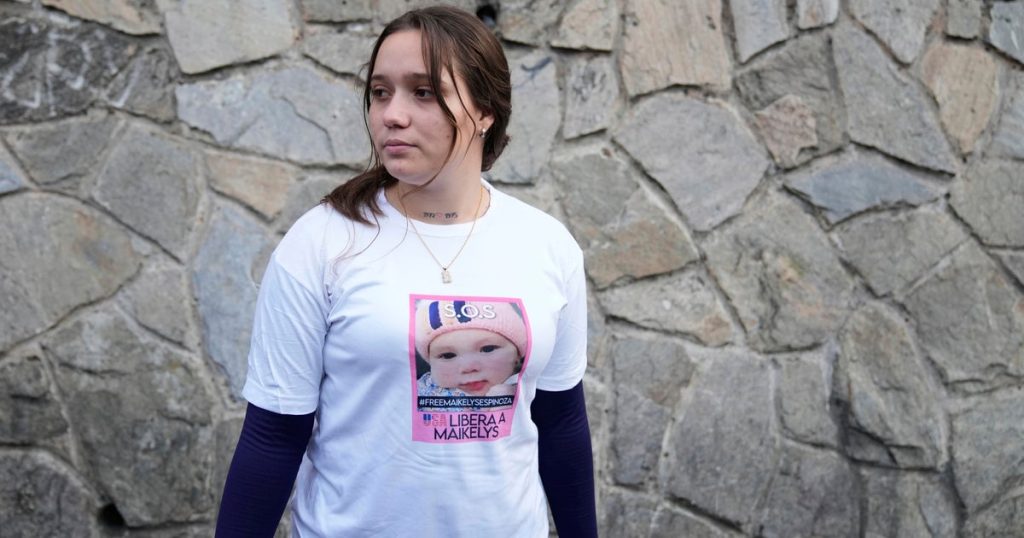A significant event unfolded on Wednesday when a 2-year-old girl named Maikelys Espinoza was reunited with her mother in Venezuela after being separated due to deportations. Maikelys arrived alongside over 220 deported migrants at an airport outside Caracas. This situation, described by Venezuelan officials as a kidnapping, has garnered international attention and sparked discussions on immigration policies under the previous U.S. administration.
| Article Subheadings |
|---|
| 1) The Arrival of Maikelys Espinoza in Venezuela |
| 2) Claims of Gang Affiliations |
| 3) International Reactions and Diplomatic Talks |
| 4) Venezuelan Government’s Stance on Deportations |
| 5) Underlying Issues of Immigration Policy |
The Arrival of Maikelys Espinoza in Venezuela
On Wednesday, Maikelys Espinoza arrived at an airport near the Venezuelan capital, Caracas, as part of a large group of over 220 deported migrants. This emotional moment was captured on state television, showcasing the Venezuelan First Lady, Cilia Flores, carrying the toddler upon her arrival. Family reunification took center stage as Maikelys was brought to her mother, Yorely Bernal, who waited anxiously at the presidential palace alongside President Nicolás Maduro. The poignant scenes marked both a personal victory for Bernal and a significant event in the ongoing debate surrounding immigration and deportation policies.
Claims of Gang Affiliations
The U.S. government’s decision to separate Maikelys and her parents was rooted in allegations involving gang affiliations. According to U.S. officials, both parents purportedly had connections to the Tren de Aragua gang—a group that President Trump designated as a terrorist organization earlier this year. This classification intensified scrutiny on Venezuelan nationals involved in U.S. immigration processes. Critics argue that the lack of substantial evidence supporting these claims has raised ethical questions about family separations based on unverified allegations. The U.S. administration has remained firm on its stance, asserting that immigration law enforcement must prioritize national security.
International Reactions and Diplomatic Talks
The return of Maikelys has elicited mixed reactions from various global figures. Venezuelan officials heralded the event as a major diplomatic achievement, with Interior Minister Diosdado Cabello describing it as a “great victory.” The Venezuelan government has leveraged this moment to criticize U.S. policies, framing them as inhumane and often detrimental to families. President Maduro extended his gratitude to President Trump, characterizing the reunion of Maikelys with her mother as a “profoundly humane act.” However, critics of both administrations point out the complexities of international diplomacy with underlying issues often sidelined in favor of media spectacles.
Venezuelan Government’s Stance on Deportations
Historically, the Maduro administration has been reluctant to accept deported migrants from the U.S., with many Venezuelans finding themselves stuck in limbo. Recently, however, as the Trump administration intensified its crackdown on immigration, hundreds of Venezuelans—like Maikelys’ parents—have been forced to return. This influx has brought attention to the implications of such policies on vulnerable populations, particularly women and children. In total, hundreds of Venezuelans have been deported under similar circumstances, prompting humanitarian concerns regarding their treatment and rights upon return.
Underlying Issues of Immigration Policy
The issues surrounding Maikelys’ case highlight the broader implications of U.S. immigration policy, particularly those enacted under the Trump administration. The use of an 18th-century wartime law for deportations and the handling of unaccompanied minors underscore systemic challenges in the U.S. immigration system. Advocates for immigration reform argue for more humane approaches, emphasizing the importance of the family unit in any discussion of immigration. Meanwhile, in light of ongoing tensions between the U.S. and Venezuela, the reunification of Maikelys and her mother serves as a poignant case study in the lives affected by bureaucratic measures.
| No. | Key Points |
|---|---|
| 1 | Maikelys Espinoza was reunited with her mother in Venezuela after a controversial deportation. |
| 2 | Claims against the girl’s parents involve alleged gang affiliations, raising concerns over evidence. |
| 3 | The Venezuelan government has criticized U.S. immigration policy amid this case. |
| 4 | The Maduro administration has changed its position toward accepting deportees from the U.S. |
| 5 | The case highlights broader issues in U.S. immigration policy and its impact on families. |
Summary
The reunification of Maikelys Espinoza with her mother is a deeply significant event amidst ongoing discussions of immigration policy, family separation, and international relations. Positioning the issue within a broader context raises important questions about legal protections for families and the treatment of vulnerable populations under harsh immigration policies. As the dialogue progresses, the need for reform and humane consideration becomes increasingly paramount.
Frequently Asked Questions
Question: What led to the separation of Maikelys and her parents?
Maikelys was separated from her parents due to allegations that they had ties to the Tren de Aragua gang, resulting in their deportation from the U.S.
Question: What actions did the Venezuelan government take regarding deported migrants?
Historically resistant to accepting deported individuals, the Venezuelan government has recently altered its stance, accepting hundreds of deportees amid changes in U.S. immigration policies.
Question: How has the U.S. government responded to accusations of misconduct in deportations?
The U.S. government has maintained that their immigration enforcement actions are necessary for national security, citing gang-related threats, although critics highlight the lack of substantial evidence backing these claims.


